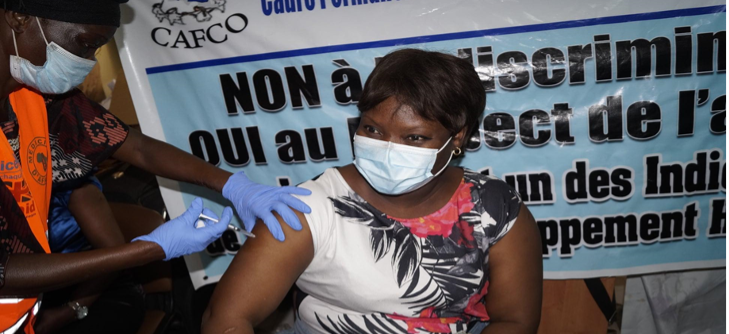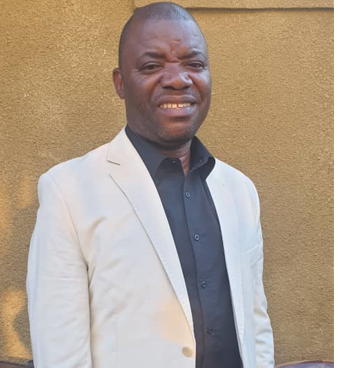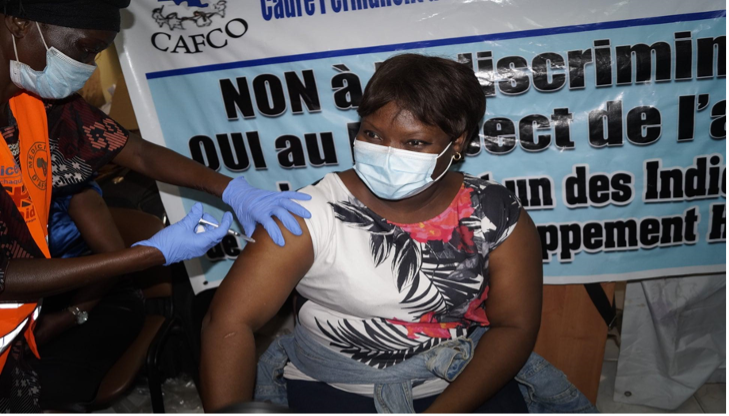DRC Community Leaders Are Activating Their Networks to Encourage COVID-19 Vaccination
Published on March 17, 2022

Cliquez ici pour accéder à la version francaise de cette article.
It’s been over a year since the first COVID-19 vaccines were distributed around the world, but in countries like the Democratic Republic of the Congo (DRC), where vaccination rates remain low—less than 1 percent of the 53 million people eligible for vaccination are fully vaccinated against COVID-19—barriers persist.1 Some of this can be attributed to supply chain challenges, such as syringe shortages, but low vaccine demand has been fueled by mis- and disinformation.2, 3

Community leaders like Bishop Josué Wembi had no knowledge of COVID-19 in the early days of the pandemic. “The only information I had was through social networks such as WhatsApp,” he said. “The information that was circulating gave me the impression not only that COVID-19 didn’t exist, but also that the vaccines being manufactured were dangerous.”
As a result of this misinformation, Bishop Josué discouraged his fellow pastors and members of his congregation from getting vaccinated. Bishop Josué is the Secretary General of the Plateforme des Églises de Réveil (UMOJA), a network of revivalist churches composed of 800 pastors in Kinshasa.
When COVID-19 was first detected in the DRC, Mme. Adeline d’Or Omeokoko a Sama Ato encouraged women to wear masks and wash their hands to protect themselves from the virus. But when the COVID-19 vaccine became available, she had doubts because of the information she heard from members of her community, including faith leaders.
“I had a lot of concerns about the side effects of the vaccine and the consequences for pregnant women,” she said. “I was very afraid. I decided not to get vaccinated.”

Mme. Adeline is the Secretary General of the Cadre Permanent de Concertation de la Femme Congolaise (CAFCO), a civil society organization committed to strengthening fundamental freedoms for women in the DRC.
When influential people, like Bishop Josué and Mme. Adeline, have doubts about the COVID-19 vaccine, one can imagine how the general public felt as well.
The DRC government’s Expanded Program on Immunization (EPI) partnered with MOMENTUM Routine Immunization Transformation and Equity to increase COVID-19 vaccine demand. They held two workshops in Kinshasa in 2021 with members of professional associations, civil society organizations, and faith-based organizations.
Both Bishop Josué and Mme. Adeline were invited to attend on behalf of their organizations.
“When I was asked to participate in this workshop, I was curious and interested, especially because one of our members… fell ill with COVID-19 and died.” – Mme. Adeline
Facilitating Partnerships to Increase COVID-19 Vaccine Demand
Throughout the workshops, Bishop Josué and Mme. Adeline had the opportunity to share their concerns and experiences about vaccination in a welcoming environment without judgment or stigma. Experts from the EPI, USAID MOMENTUM, and other participating partners, including the World Health Organization, USAID Breakthrough ACTION, and VillageReach, listened and responded to all concerns. They shared relevant information through presentations, including sensitizing participants to the “infodemic,” the phenomenon of having too much information, including false or misleading information, in digital and physical environments during a disease outbreak.
“I personally learned a lot about vaccination, the development of the COVID-19 vaccine, and how to distinguish between good information and rumors,” said Bishop Josué. The workshops explored ways organizations can work together to increase COVID-19 vaccination uptake. Participating organizations developed commitments to take action following the workshops. Bishop Josué and Mme. Adeline participated in interactive exercises to understand the challenges and co-create solutions with the EPI to increase the number of people vaccinated against COVID-19.
“After two days of exchanges on COVID-19, vaccinations, and management of rumors, I immediately understood how my organization could help the EPI protect the population against COVID-19 through vaccination,” said Mme. Adeline.
Both Bishop Josué and Mme. Adeline decided to get vaccinated after the workshops and encouraged others to do the same.
“I personally learned a lot about vaccination, the development of the COVID-19 vaccine, and how to distinguish between good information and rumors.” – Bishop Josué.
Following Through with Action: Vaccinating More People Against COVID-19
Since the workshops, Bishop Josué’s and Mme. Adeline’s organizations have followed through on their commitments to take action. CAFCO is committed to encouraging women in all 26 provinces of the DRC to get vaccinated. They used testimonials from vaccinated members and showed influential members getting the vaccine on television. Mme. Adeline was instrumental in these efforts. “I started to lead by example,” she said. “I encouraged both my parents to get vaccinated—both of them took the two doses.”
In partnership with the EPI, CAFCO organized four outreach sessions resulting in 137 members getting vaccinated. The sessions were held in Kinshasa as well as in the Haut-Katanga and Kongo Central provinces. CAFCO became the first women’s organization to devise a mass COVID-19 vaccination campaign for its members in the DRC.

La Plateforme des Églises de Réveil (UMOJA) committed to training 800 affiliated pastors as peer educators to encourage COVID-19 vaccination among their congregants. Bishop Josué played a role by sharing the information he learned with the pastors in his congregation, and more widely among pastors that are part of the network. He addressed their concerns and encouraged them to talk with their congregants about getting vaccinated. In partnership with MOMENTUM, UMOJA organized training sessions for 240 pastors in Kinshasa to prepare them to speak about COVID-19 vaccination. They also mobilized an immunization team to vaccinate congregants and other members of the public; more than 200 people were vaccinated against COVID-19 in the days and weeks following.
The collective efforts of organizations across public and private sectors working inside and outside the health sector have strengthened DRC’s approach to increasing COVID-19 vaccination uptake. The success of these partnerships resulted from creating an open environment for dialogue and co-creation where participants were active shapers and owners of their action plans. EPI and MOMENTUM influenced participants’ opinions by addressing their concerns about vaccination, creating a culture of trust, and converting their engagement into action. Creating such an environment was essential to engaging these organizations as partners.
MOMENTUM Routine Immunization Transformation and Equity continues to support these innovative partnerships by working with organizations to accomplish their action plans, facilitating linkages to the EPI and vaccination teams as needed, and helping individuals like Bishop Josué and Mme. Adeline share their experiences and scale their efforts.
To continue to reach more people, MOMENTUM will share knowledge and lessons learned from these workshops to overcome the challenges in the DRC.
References
- World Health Organization. WHO Coronavirus (COVID-19) Dashboard. Last updated January 21, 2022. https://covid19.who.int/table.
- Adepoju, Paul. 2021. “As COVID-19 vaccines arrive in Africa, Omicron is reducing supply and increasing demand.” Nature Medicine, December 13, 2021. https://www.nature.com/articles/d41591-021-00073-x.
- Ditekemena, John D., Dalau M. Nkamba, Armand Mutwadi, Hypolite M. Mavoko, Joseph Nelson Siewe Fodjo, Christophe Luhata, Michael Obimpeh, Stijn Van Hees, Jean B. Nachega, and Rober Colebunders. 2021. “COVID-19 Vaccine Acceptance in the Democratic Republic of Congo: A Cross-Sectional Survey.” Vaccines 9(2): 153. https://www.ncbi.nlm.nih.gov/pmc/articles/PMC7917589/.

